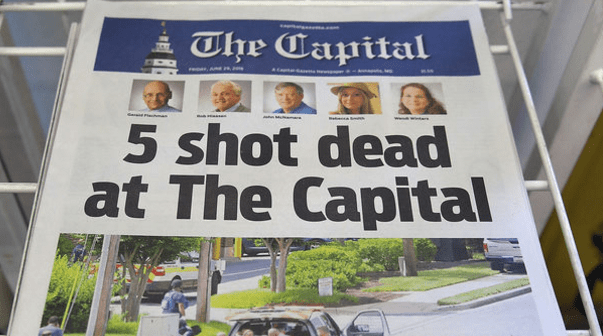5 Killed at Annapolis Newspaper: Hitting Home
By • June 29, 2018 0 499

This one hurts. This one really hurts.
We have almost — almost but not quite — become inured to the instances of mass shootings in our American lives: the killings of school children from Colorado to Florida which occur with monotonous regularity, office shootings, shootings in the streets of Las Vegas and a concert hall in Orlando.
But the June 28 office invasion in nearby Annapolis, Maryland, that resulted in the shooting deaths of five staff members of the Capital Gazette and injuries to two others struck home like a punch to the gut to some of us, shocking and wounding as it was to the country as a whole.
The five Gazette employees — writers, reporters, editors and an account executive — were members of a time-honored institution, the daily newspaper of Maryland’s state capital which also served the surrounding communities and region, and, reportedly dated back to colonial days.
To anyone who has ever wielded pen, pencil, typewriter or computer keyboard in the service of journalism, be it ever so small in size or large in reputation and circulation, you would know that we at The Georgetowner newspaper feel deeply the news and the details of the moment, as a 38-year-old man named Jarrod Ramos, seeking revenge over a lost defamation case against the paper dating back to 2015, fired a shotgun through the office window of the Gazette.
Killed in the shootings were Rob Hiaasen, 59, Wendi Winters, 65, Gerald Fishman, 61, John McNamara, 56, and Rebecca Smith, 34.
Smith was a sales assistant who came to the paper less than a year ago. Fishman was the paper’s editorial page editor. McNamara was a jack-of-all-stories feature writer who loved sports. Hiaasen was an edgy, gifted former Baltimore Sun writer whose brother was Carl Hiaasen, a sharply satiric mystery writer whose novels were set among the more lunatic denizens of South Florida.
We at The Georgetowner (as members in good standing of the community of small newspapers) recognized the victims as family immediately, members of the larger community of journalism and the tribe of what used to be called “ink-stained wretches.”
The Gazette is a daily newspaper first and foremost, an institution which at every level is undergoing serious economic stresses. Significant numbers have folded, so that publications from the Washington Post and the New York Times to smaller dailies like the Gazette are becoming rare as unicorns. Under the broader heading of “the media” this also includes weeklies, monthlies, and news magazines, including, The Georgetowner.
They all endure and live dangerously in times when the president himself has called the media “enemies of the state,” and where their existence, in one form or another, is threatened daily.
But the lives taken are not about a political issue, but rather about lives lived in the pursuit of a profession conducted with love and honor, about men and women who live recognizable lives as parents, providers, friends and family and community members.
These men and women wrote about the confines of suburban communities and a historic state capital, about nation and neighborhood, about high school football, festivals, weddings and galas. They identified, not with political parties but with neighborhood people at a party.
They also had a high calling. Jimmy DeButts, a Gazette editor, described their world: “There are no 40-hour weeks, no big paydays—just a passion for telling stories from our community. We keep doing more with less. We find ways to cover high school sports, breaking news, tax hikes, school budgets and local entertainment. We are there in times of tragedy. We do our best to share the stories of people those who make our community better. Please understand, we do all this to serve our community.”
I can attest to that, having worked on two Northern California dailies for ten years back in the day and written uncounted stories for The Georgetowner for more than 35 years.
Our days, these days, are filled with the exchanges of insults, threats and vulgarities that try and fail to pass themselves off as debates. Violence, and incitements to violence and incivilities fill the air like flies or mosquitos.
But this one . . . This one hurts.

